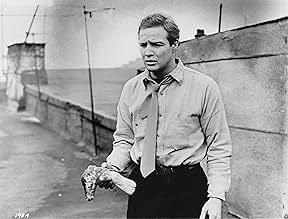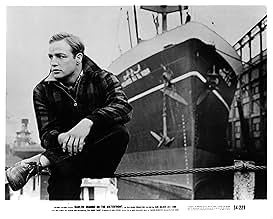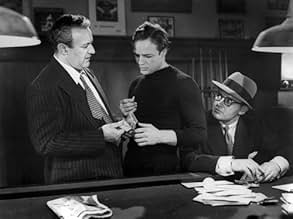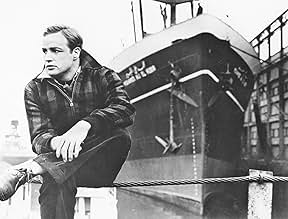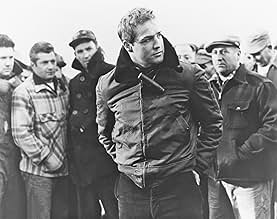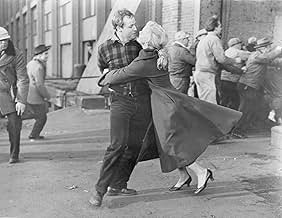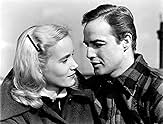An ex-prize fighter turned New Jersey longshoreman struggles to stand up to his corrupt union bosses, including his older brother, as he starts to connect with the grieving sister of one of ... Read allAn ex-prize fighter turned New Jersey longshoreman struggles to stand up to his corrupt union bosses, including his older brother, as he starts to connect with the grieving sister of one of the syndicate's victims.An ex-prize fighter turned New Jersey longshoreman struggles to stand up to his corrupt union bosses, including his older brother, as he starts to connect with the grieving sister of one of the syndicate's victims.
- Won 8 Oscars
- 30 wins & 10 nominations total
- 'Pop' Doyle
- (as John Hamilton)
- Gillette
- (uncredited)
- Sidney
- (uncredited)
Best Picture Winners by Year
Best Picture Winners by Year
Storyline
Did you know
- TriviaIn his biography of Elia Kazan, Richard Schickel describes how Kazan used a ploy to entice Marlon Brando to do the movie. He had Karl Malden direct a scene from the film with an up-and-coming fellow actor from the Actors Studio playing the Terry Malloy lead role. They figured the competitive Brando would not be eager to see such a major role handed to some new screen heartthrob. The ploy worked, especially since the competition had come in the form of a guy named Paul Newman.
- GoofsWhen Father Barry (Karl Malden) gets hit in the head with a beer can, he gets a cut on his forehead, which bleeds visibly in the scene. In subsequent scenes, there is no sign of the cut or of a bandage to show that he had been hurt.
- Quotes
Charley Malloy: Look, kid, I... how much you weigh, son? When you weighed one hundred and sixty-eight pounds you were beautiful. You coulda been another Billy Conn, and that skunk we got you for a manager, he brought you along too fast.
Terry Malloy: It wasn't him, Charley, it was you. Remember that night in the Garden you came down to my dressing room and you said, "Kid, this ain't your night. We're going for the price on Wilson." You remember that? "This ain't your night"! My night! I coulda taken Wilson apart! So what happens? He gets the title shot outdoors on the ballpark and what do I get? A one-way ticket to Palookaville! You was my brother, Charley, you shoulda looked out for me a little bit. You shoulda taken care of me just a little bit so I wouldn't have to take them dives for the short-end money.
Charley Malloy: Oh I had some bets down for you. You saw some money.
Terry Malloy: You don't understand. I coulda had class. I coulda been a contender. I coulda been somebody, instead of a bum, which is what I am, let's face it. It was you, Charley.
- Crazy creditsOpening credits are shown over a bamboo-type mat background.
- Alternate versionsCriterion Collection Blu-ray Disc release exhibits the film in 1.66:1, which is widely regarded to be the "correct" aspect ratio for the film. However, a second disc includes the film in 1.33:1 AND 1.85:1, so that viewers can watch the film in the different ratios.
- ConnectionsEdited into Un Américain nommé Kazan (2018)
In the most famous scene, Brando, a has-been prizefighter, confronts his brother (Steiger) who is about to set him up to be executed by the mob bosses of the union. When Steiger reveals his intent to set Brando up, the scene explodes with reality and pathos. Brando's words, "Wow", sum up the intensity and emotion of the scene.
Great acting and directing, however, cannot cover up the transparent political/apologetical intent of the movie. Two years earlier, Kazan had sold out his integrity to the House Unamerican Affairs Committee (HUAC), "naming names" of those who would become the blacklisted Hollywood 10. Kazan, a former communist himself, regretted his involvement with the Party, and evidently decided it was politically advantageous to name his former associates. Likewise, Brando character Malloy finds himself in a mob-run labor union, and in his effort to 'get out', repeats much of what Kazan did in real life. Worse, Kazan, through the allegorical message of the film, brands his former writers as criminals and murders, and himself as the naive innocent. Being a communist was no crime in the 30s, and he was no innocent.
"On the Waterfront" is thus steeped in a right-wing political worldview. Mobs run labor unions. Unions are thus corrupt organizations who exploit workers and make it harder for businesses to thrive. Turn in union leaders into the police. Even the church becomes a tool of the state to further the cause of the police against the union.
Brando was never satisfied with "On the Waterfront". In fact, he later commented that it was indeed a tool for Kazan to justify his actions to the HUAC. One thumb up for the acting, one thumb down for the cheap political message.
Details
- Release date
- Country of origin
- Languages
- Also known as
- Bottom of the River
- Filming locations
- St Peter and St Paul Church - 400 Hudson Street, Hoboken, New Jersey, USA(interiors: church)
- Production company
- See more company credits at IMDbPro
Box office
- Budget
- $910,000 (estimated)
- Gross worldwide
- $3,768
- Runtime1 hour 48 minutes
- Color
- Aspect ratio
- 1.66 : 1
- 1.85 : 1
Contribute to this page



